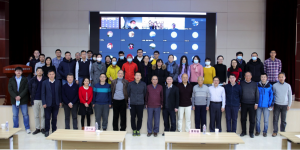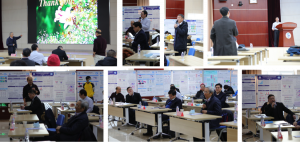The TEA-START annual science meeting was organized on January 20, 2021 at Chinese Academy of Science Institute of Atmospheric Physics in Beijing. The event was a combination of on-site meeting and online participation. 50 TEA scientists and invited guests attended the physical meeting in accordance with social distancing policy, but over 4,400 participants, including members of science committee, staff members, graduate students, and a broad audience across the country and beyond joined the meeting online.
The full-day events began with welcome remarks from the director of TEA-START and the chair of the science committee, followed by the TEA-START annual progress report, which overviews major research and capacity building activities and achievements in the past twelve months. The report shows that the regional center currently leads five international research projects funded by NSFC and CAS; over 36% of its peer-reviewed publications were co-authored with international colleagues; and it hosts eight foreign graduate students from Africa and Asia. The members of the science committee and invited guests discussed the scope and objectives of the center and gave very positive comments and suggestions on its priorities and progresses. It was suggested that inter-disciplinary approaches of global change and regional climate-ecosystem-human interactions should continue to be the research focus, along with regional research and data capacity building.
The science presentations were organized into three sessions that covered the main research fields of TEA-START, including 1) interactive changes of regional climate and ecosystems, 2) global change and regional coordinated responses, and 3) development and application of regional Earth system models. Five invited scientists delivered keynote talks on extreme cold events over Eurasia and attribution, integrated field-satellite observation over major urban clusters, hydrological cycle and extreme precipitation events, dryland ecosystem dynamics and climate change, and big Earth data in support of cryosphere research. Eleven TEA scientists presented their research progresses that covered a wide spectrum of TEA foci. The keynotes and oral presentations were followed by heated discussions and debate on research findings and the future direction of the center. Key insights that emerged from the discussion included the need for regional data standardization and sharing, enhancing the human dimension of regional Earth system research, and embedding international network into research activities.




